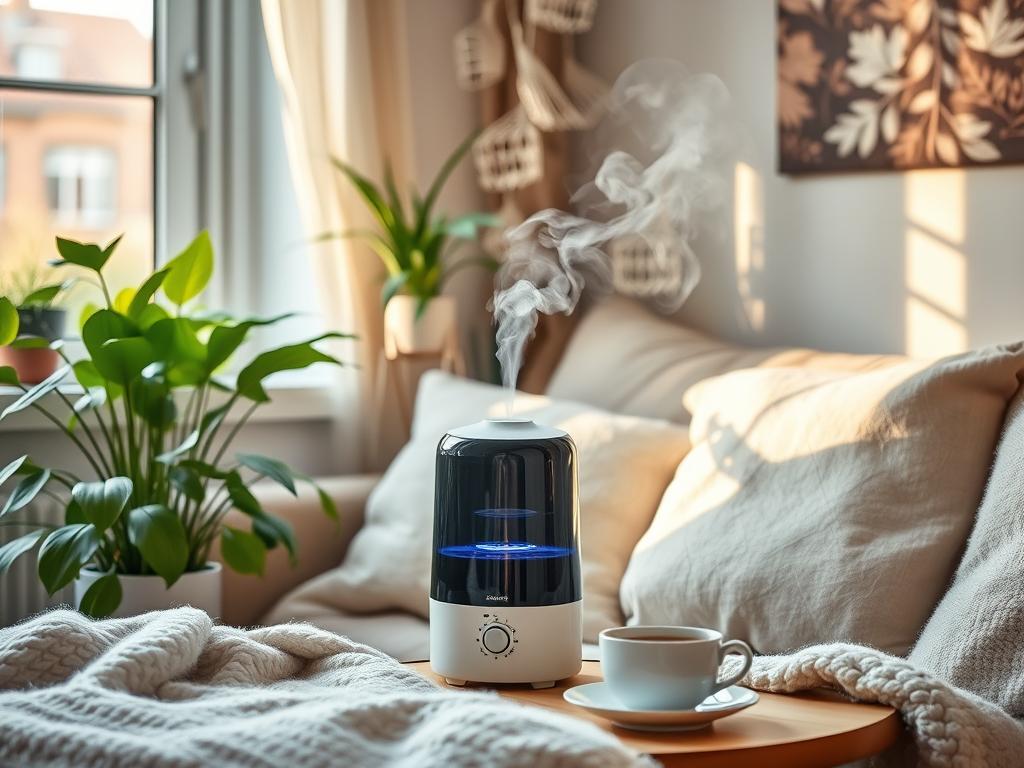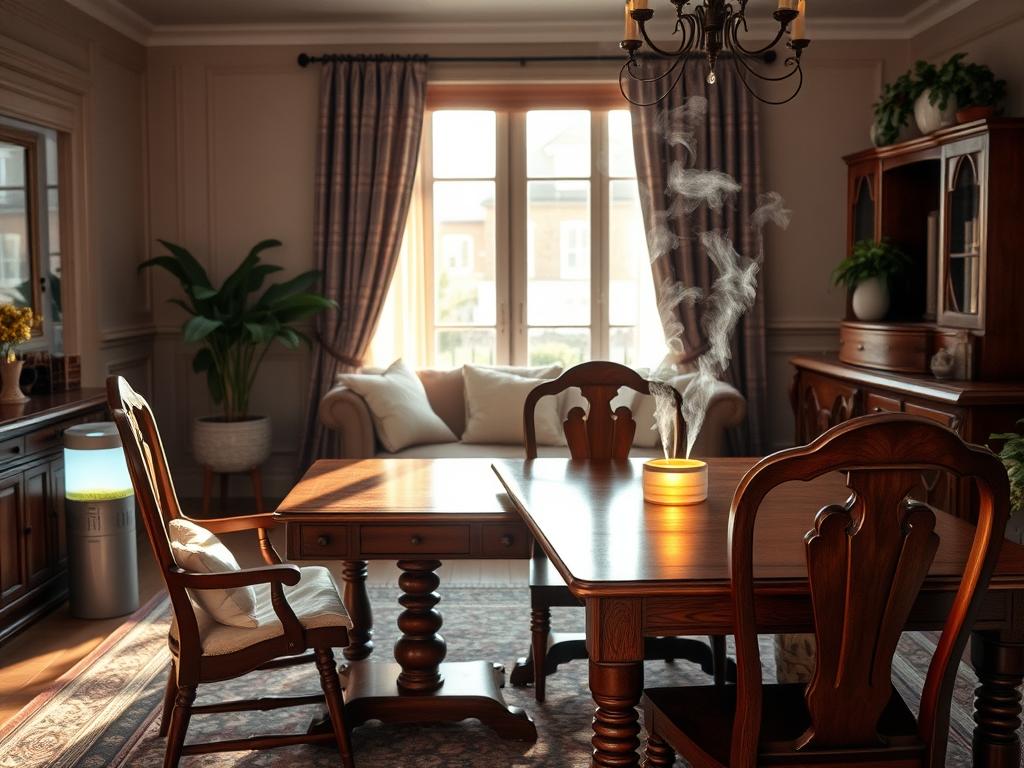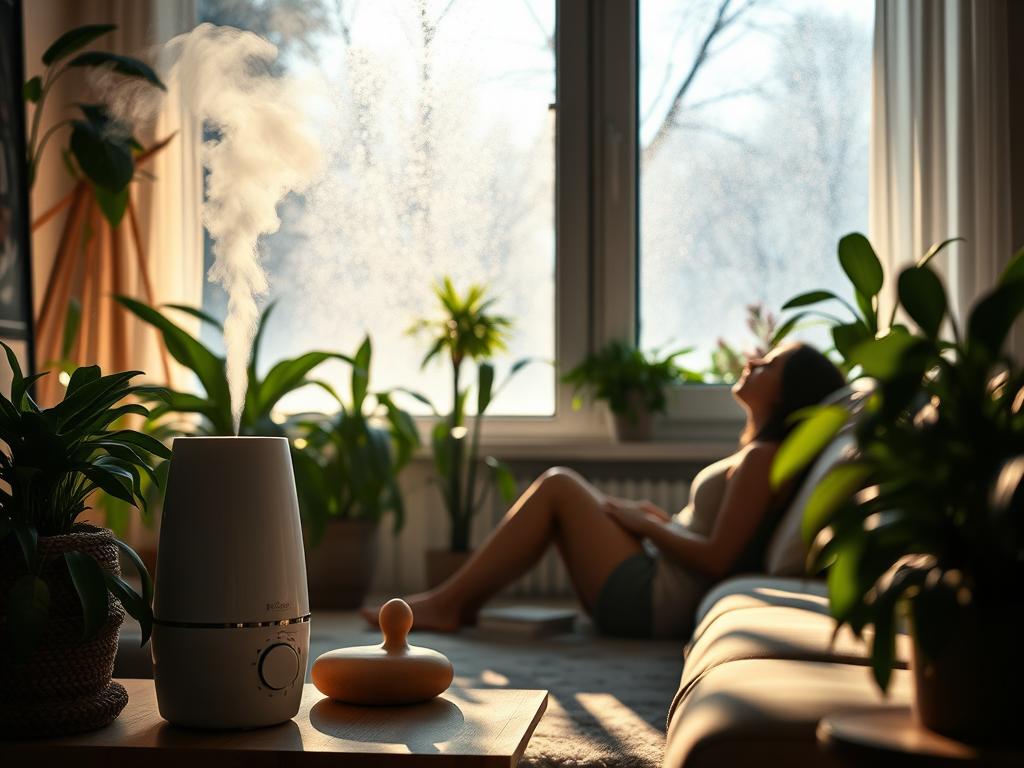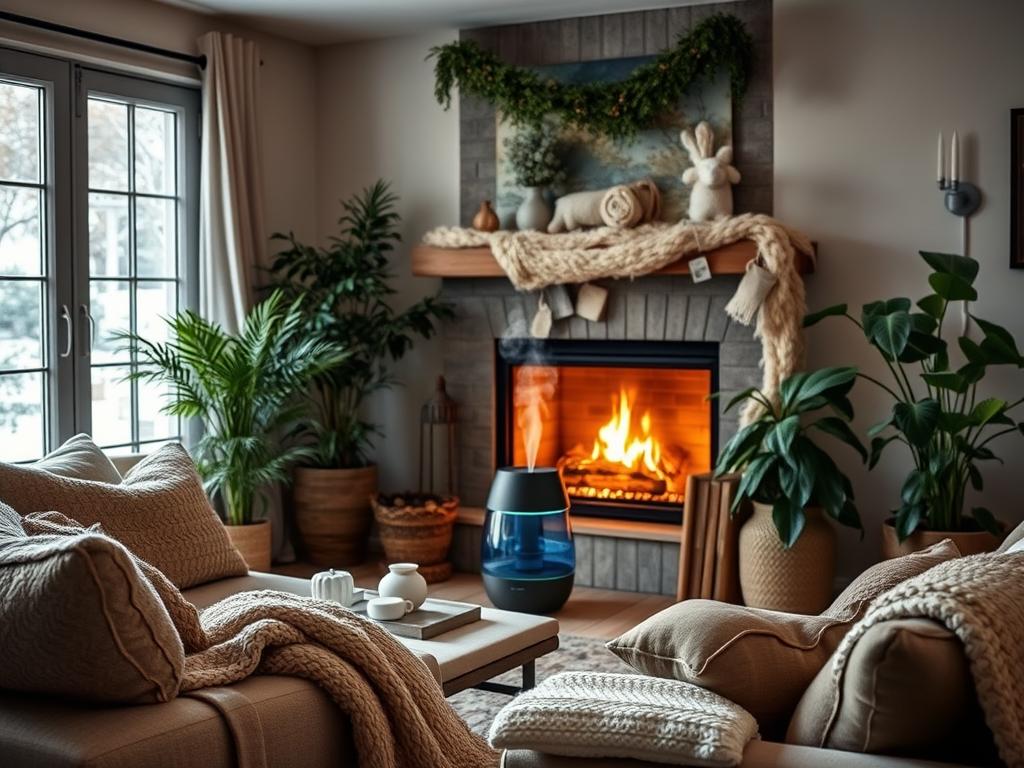This blog contains affiliate links.
Did you know that indoor humidity drops by 25% in American homes during winter? This change affects your health, comfort, and home. Using a humidifier is key to keeping your indoor humidity right.
Humidifiers solve many problems, like dry skin and breathing issues. They also protect your furniture. Knowing the value of good air quality and humidifiers makes your home healthier and more cozy during winter.
Key Takeaways
-
- Dry winter air can lead to various health and home-related issues
- Humidifiers help maintain optimal indoor humidity levels for improved comfort and well-being
- Benefits of using a humidifier include better sleep, relief from cold and flu symptoms, and protection for your home and belongings
- Humidifiers can also help manage asthma and allergy symptoms, as well as provide energy efficiency and cost savings
- Proper humidification is essential for the health of your indoor plants and pets during the dry winter months
Dry winter air can lead to various health and home-related issues, making it essential to take proactive steps to maintain a comfortable and healthy living environment. One significant aspect to consider is houseplant care. During the colder months, indoor plants are at risk from low humidity levels, which can contribute to leaf drop and other health problems for the plants. Regularly misting your plants or placing them near a humidifier can help mitigate these effects, ensuring that they thrive even when the air is dry.
In addition to plant health, it is equally important to focus on wood furniture protection during these harsher seasons. Dry air can cause wood to crack or become overly dry, diminishing the beauty of your furniture. To prevent this, consider using a humidifier in your living space and applying a quality furniture polish to provide a protective barrier for your wooden items. Incorporating these practices not only preserves the aesthetics of your furnishings but also extends their lifespan, making your investments last longer.
Another concern tied to dry air is the increased likelihood of static electricity buildup. This phenomenon can be particularly annoying and even disruptive, especially in homes with electronic devices. To combat static electricity prevention, maintaining proper humidity levels in your home is key. Furthermore, incorporating anti-static sprays on carpets and upholstery can also be beneficial. By addressing these interconnected issues, you can create a more pleasant and inviting home environment during the winter months.As winter approaches, many people find themselves grappling with the challenges of dry indoor air. One common question that arises is, “why should I use a humidifier this winter?” The answer lies in the myriad benefits that a humidifier can provide not only for your comfort but also for your health. Adding moisture to the air can help alleviate the common issues associated with the dry winter months, such as irritated skin, dry throat, and cracked lips, making it an essential tool in every household.
Maintaining proper skin hydration is crucial during this time of year. The lack of humidity can exacerbate skin conditions, making it feel tight and uncomfortable. Using a humidifier can help keep your skin supple and hydrated, improving its overall condition and appearance. By ensuring a consistent level of moisture in the air, you can create an environment that promotes skin health and comfort, allowing you to enjoy winter to the fullest. This simple addition can transform your living space, making it not only more enjoyable but also healthier.
In addition to supporting your skin’s moisture levels, a humidifier can also reduce the chances of respiratory issues during winter. Dry air can irritate your nasal passages and throat, making it easier for illnesses to take hold. By introducing humidity into your home, you can create a barrier against these discomforts and maintain a healthier environment for you and your family. For those who suffer from allergies, a humidifier can also help alleviate airborne allergens, resulting in a fresher living space.
Finally, integrating products like anti-static sprays on carpets and upholstery can complement the effects of a humidifier, helping to reduce static electricity and enhance overall comfort. By addressing these interconnected issues, you can create a more pleasant and inviting home environment during the winter months. Investing in a humidifier, alongside other strategies, can significantly improve your winter experience, making it a smart choice for anyone looking to prioritize their well-being in the colder season.
Understanding Winter Air Quality and Its Impact on Health
Winter brings dry, cold air that affects our breathing. This can lead to health problems. Knowing how dry air impacts indoor air quality is key to a healthy home.
How Dry Air Affects Your Indoor Environment
Winter air is often drier because of the cold. This dryness causes several issues at home, including:
- Increased static electricity
- Dry and irritated skin
- Cracked and peeling paint or wallpaper
- Damage to wood furniture and floors
- Increased dust and airborne particles
Common Signs of Low Humidity in Your Home
Not sure if your air is too dry? Look out for these signs:
- Frequent static shocks when touching metal surfaces
- Dry, itchy skin and eyes
- Increased sinus congestion or nosebleeds
- Crackling or popping noises from wood furniture
- Excessive dust accumulation on surfaces
Spotting these signs means it’s time to get a humidifier. It will help keep your home’s moisture balanced and protect your health this winter.
Why Should I Use a Humidifier This Winter
As winter comes, the air gets drier. Using a humidifier can greatly benefit your health and home. It’s key to keep indoor humidity right during winter, and a humidifier helps a lot.
One big reason to use a humidifier is for comfort. Dry air can make your skin itchy and flaky. A humidifier adds moisture, making your skin softer and healthier.
Also, dry air can make breathing harder, leading to sinus problems and asthma. A humidifier keeps the air moist, easing breathing and reducing infection risks.
Another benefit is better sleep. Dry air can irritate your nose and throat, causing snoring and waking up often. A humidifier makes the air more comfortable, helping you sleep better.
Lastly, a humidifier protects your home. Dry air can damage wood and musical instruments. It keeps your belongings safe and extends their life.
In short, there are many good reasons to use a humidifier this winter. It improves comfort, health, and protects your home. So, get a good humidifier to enjoy these benefits all winter long.
Essential Benefits of Running a Humidifier During Winter Months
When it gets colder and the air dries out in winter, a humidifier can really help. It improves sleep, skin, and hair health. These benefits are amazing.
Improved Sleep Quality and Comfort
Dry air can bother your nose and throat, making it hard to sleep. A humidifier adds moisture, easing these issues. This lets you sleep better and feel more awake during the day.
Relief from Cold and Flu Symptoms
Dry air can make breathing harder, worsening cold and flu symptoms. A humidifier keeps the air moist, easing these problems. It’s great for people with asthma or bronchitis.
Better Skin and Hair Health
Dry air can dry out your skin and hair, making them brittle. A humidifier adds moisture, keeping your skin soft and your hair healthy. It also stops static electricity.
Using a humidifier in winter has many benefits. It improves sleep, skin, and breathing. These advantages are clear and important for your health.

Protecting Your Home and Furnishings with Proper Humidity
Keeping the right humidity in your home is key for your health and comfort. It also helps protect your valuable items. In the dry winter, low humidity can harm your wood furniture, making it crack and lose its shine. It can also cause static electricity, damaging electronics and being a nuisance.
To keep your wood furniture safe, using a humidifier is a must. It adds moisture to the air, keeping wood furniture in great shape. This not only keeps your furniture looking good but also saves you from expensive repairs.
Running a humidifier also helps prevent static electricity. Dry air is perfect for static buildup, causing shocks and damaging electronics. With the right humidity, you can reduce static, making your home safer and more comfortable.
A humidifier also protects other moisture-sensitive items in your home. This includes musical instruments, art supplies, and certain floors. By controlling humidity, you keep these items in perfect condition, saving your investment and preserving your treasured belongings.

“Proper humidity levels are essential for protecting your home and its contents from the damaging effects of dry air.”
Respiratory Health Benefits and Allergy Relief
Keeping the air inside your home clean is key, more so in the dry winter months. Using a humidifier adds moisture to the air. This brings many benefits, like easing breathing problems and helping with allergies.
Managing Asthma Symptoms
Dry air can make asthma worse, irritating the airways. A humidifier keeps the air moist. This makes breathing easier and can cut down on asthma attacks.
Reducing Airborne Viruses
Dry air helps viruses like the common cold spread. By making your home’s air more humid, you make it harder for these viruses to survive. This can lower your chance of getting sick and improve your breathing.
| Benefit | Description |
|---|---|
| Asthma Symptom Management | Moist air can help reduce airway irritation and inflammation, leading to fewer asthma attacks. |
| Allergy Relief | Improved indoor air quality can alleviate allergy symptoms by reducing the presence of allergens. |
| Virus Reduction | Increased humidity can create an environment less favorable for the survival of airborne viruses. |
Adding a humidifier to your winter routine can boost your respiratory health and indoor air quality. It helps you breathe better and stay healthy all winter long.

Energy Efficiency and Cost Savings with Humidifiers
When it gets colder and we turn on the heat, keeping our homes cozy can be expensive. But, using a humidifier in winter does more than just improve the air we breathe. It also helps save energy and lower heating bills.
Humidifiers make the air feel warmer, even if we set the thermostat lower. Dry air makes us lose heat faster, making us feel colder. Adding moisture to the air with a humidifier makes our homes feel warmer at lower temperatures. This lets us turn down the heat and save on energy costs.
| Humidity Level | Temperature Perception | Energy Savings |
|---|---|---|
| 30-50% Humidity | Feels 2-4°F Warmer | Up to 4% Heating Cost Reduction |
| 50-60% Humidity | Feels 4-6°F Warmer | Up to 6% Heating Cost Reduction |
Experts say that keeping humidity between 30-60% can make our homes feel up to 6°F warmer. This can cut heating costs by up to 6%. Running a humidifier can make our homes more comfortable and save us money on energy bills.
Proper humidification also helps our homes last longer. It prevents wood, fabrics, and other materials from drying out and cracking. This protects our investment in our homes and its contents.
Getting a good, energy-saving humidifier is a smart choice for winter. It keeps our homes cozy, saves on heating costs, and protects our belongings.
Caring for Indoor Plants and Pets During Dry Winter Months
As winter comes, we must think about how dry air affects our plants and pets. Keeping humidity right is good for us and our pets. It helps everyone in the house stay healthy.
Optimal Humidity Levels for House Plants
Houseplants love humid air. It stops their leaves and soil from drying out. Most plants do best in humidity between 40-60%. A humidifier can make your home a better place for plants to grow and look their best all winter.
- Tropical plants, like ferns and orchids, need even more humidity, around 60-80%.
- Succulents and cacti, though, prefer drier air and might not need as much humidity.
Pet Comfort and Health Considerations
Our pets can also get affected by dry air in the winter. The right humidity helps them stay healthy and feel better.
- Skin and Coat Health: Dry air can make pets’ skin dry and itchy, and their fur dull and brittle. Good humidity keeps their skin and fur in good shape.
- Respiratory Health: Dry air can bother pets’ breathing, making asthma or allergies worse. Humidifiers can help ease these problems and make breathing easier.
- Reduced Static Electricity: Low humidity can cause static shocks, which are bad for pets. A humidifier can cut down on these shocks.
Watching humidity levels and using a humidifier can help your plants and pets do well in the dry winter. It makes your home a healthier and more comfortable place for everyone.
Selecting the Right Humidifier for Your Space
Choosing the right humidifier for your home involves several key factors. The size of your living space is critical. You need a unit that can handle the humidity effectively. Also, picking an energy-efficient model can cut down on your utility bills in winter.
It’s also important to consider the type of humidifier. Warm-mist, cool-mist, and ultrasonic models each have their own benefits. Warm-mist humidifiers quickly raise humidity levels. Cool-mist options are quieter and offer a refreshing mist. Ultrasonic humidifiers create a fine mist, making them great for bedrooms.
When looking at humidifier benefits and indoor air quality, think about features like automatic shut-off and filter indicators. Adjustable mist output is also key. These features help keep your home comfortable and healthy all winter.


